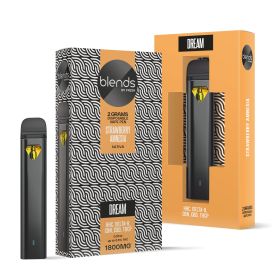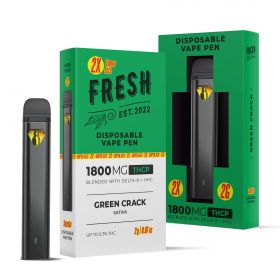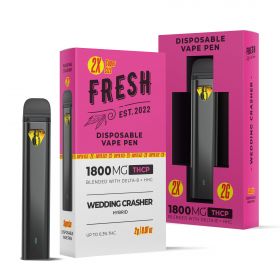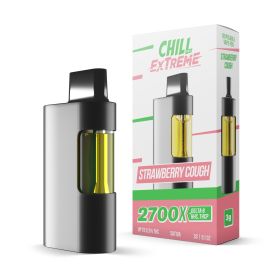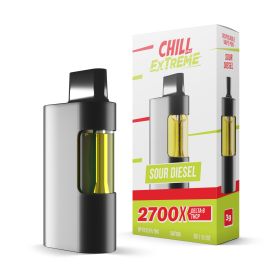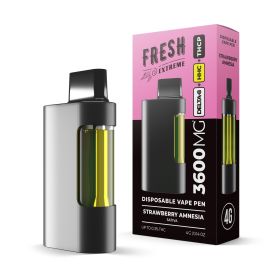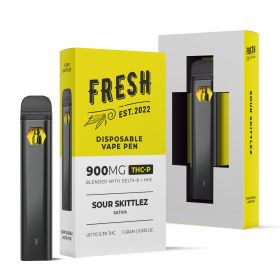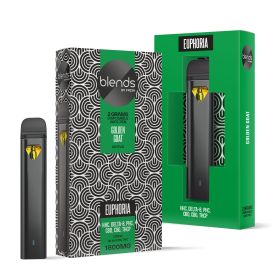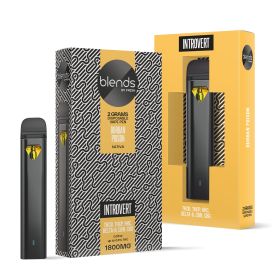THCP Products (Vape Pens, Sativa)
Customer Reviews
There are no reviews yet. Be the first to write a review!
Common Questions
THCP Products - Prepare for Potency
CBD Mall's newest groundbreaking cannabinoid will run laps around every other cannabinoid you've ever heard of, including delta 9!
In late 2019, Italian researchers discovered THCP, a compound derived from hemp with incredibly potent effects, and published their studies in the National Library of Medicine. Since then, we've been hooked!
But what exactly is this new cannabinoid that hemp consumers, and researchers are raving about? Is it beneficial and does it have other effects?
What Is THCP?
Tetrahydrocannabiphoral, or THCP, is a cannabinoid closely related to delta 9 that is usually found in low concentrations in cannabis plants. THC and THCP appear to have similar effects on the endocannabinoid system, according to the researchers who discovered it. THCP, however, binds to CB1 receptors 33 times more often than THC, thus THCP may be up to 33x more potent!
The alkyl side chains of THCP distinguish it from other cannabinoids. In simple terms, THCP contains seven carbon atoms rather than the five found in regular THC. As a result, THCP attaches more securely to endocannabinoid receptors, so it takes a smaller amount of THCP to affect the endocannabinoid system than THC.
Is THCP Synthetic?
No!
Over 140 naturally-occurring phytocannabinoids have been identified in cannabis plants, including THCP. That said, THCP levels in hemp and marijuana are low, meaning there is not enough of the compound to satisfy human needs.
THCP levels in cannabis plants are well below 0.1% in nature. As a comparison, marijuana has THC concentrations between 25% and 30% and hemp has THC concentrations of around 0.3%. Hemp usually has CBD concentrations between 20% and 30%, while marijuana has concentrations of approximately 15%.
Although THCP is naturally occurring, researchers need to derive more of it in a lab environment to satisfy market needs. Even then, when THCP is created by scientists, it comes from 100% natural hemp.
How Is THCP Created?
THCP is naturally found in very low concentrations in cannabis, so scientists have been able to create it through a series of chemical extractions and processes involving CBD.
Due to the abundance of CBD in hemp, THCP derived from the plant is not only completely federally legal under the 2018 Farm Bill, but also highly effective.
CBGA, or cannabigerolic acid, is the precursor to all cannabinoids, including THC and CBD. So, we know CBGA can transform into THCP, but how?
CBGA first reacts with other acidic compounds in hemp to create a precursor to THCP called THCPA, or tetrahydrocannabiphorolic acid
This compound then undergoes decarboxylation, a chemical reaction that removes a carboxyl group and releases carbon dioxide. In simple terms, decarboxylation involves the removal of carbon atoms from a compound's carbon chain.
The Benefits of THCP
THCP is a relatively new cannabinoid. As we mentioned previously, it wasn't discovered until 2019, so no precise studies have been conducted on its benefits and effects. We still have a lot to learn about the compound beyond the observations made by its original discoverers.
Despite this, the limited evidence seems promising. As it is so closely related to THC, we can assume that its safety profile is similar to that of the classic compound, but its effects are stronger.
The potential benefits of THCP include:
- Pain management
- Insomnia relief
- Strong psychoactive effects
The effects of THCP are similar to those of THC, but they come with more power. Therefore, THCP should have more pronounced effects on pain relief and insomnia relief than regular THC.
The compound's monster high, however, remains its primary benefit.
Other Effects of THCP
Due to the fact that THCP is a newer cannabinoid, its side effects are somewhat unknown. As it's so similar to THC, it's likely that they share side effects, including:
- Paranoia
- Anxiety
- Fatigue
- Dry mouth
- Red eyes
- Temporary memory loss
- Nausea
Since THCP binds more effectively to CB1 receptors than other cannabinoids, its adverse effects may also be more pronounced.
How Does THCP Work in the Body?
All cannabinoids works by interacting with your endocannabinoid system, including THCP. There are two types of receptors in the endocannabinoid system, CB1 and CB2. There is a difference in how they behave and how they produce different results.
The CB1 receptors are located in the nervous system and are responsible for giving you the buzzy feeling caused by psychoactive compounds such as THC and THCP.
THCP binds to CB1 receptors in your nervous system, causing a psychoactive effect.
THCP vs. Other Cannabinoids
THCP is our strongest cannabinoid to date. Despite its similarities to less potent cannabinoids, its effects are far more powerful.
THCP vs. Delta 8
THCP is estimated to be around 60 times as strong as delta 8.
In addition to its strength, THCP also has a sativa-like effect on the body; it's stimulating, potent, and may cause anxiety and rapid heartbeats.
In contrast, delta 8 is mellower and milder. There is no doubt that delta 8 products are psychoactive, but their potency makes these side effects much less likely to occur.
THCP vs. Delta 9
The effects of delta 9 products and THCP products are essentially the same. However, they differ in potency.
THCP is believed to be 33 times more psychoactive than delta 9, so you'll experience the same intense effects with much less THCP. Generally, delta 9 THC is taken in doses of around 10mg. THCP has an equivalent dose of approximately 300 micrograms, or 0.3 mg.
THCP vs. Delta 10
Delta 10 products are energetic, focusing, and creative. Most people use the compound during the day to boost their productivity and stimulate their minds.
The effects of delta 10 are considerably less psychoactive than those of THCP. Delta 10 has mild effects that enhance your ability to be productive, in contrast to THCP, which alters your mental state to such a degree that it may impact your ability to be productive.
THCP vs. HHC
Delta 9 and HHC are strikingly similar. While HHC is slightly weaker than delta 9, the two compounds have virtually the same effects.
As a result, THCP's potency differs considerably from that of HHC products.
THCP: Final Thoughts
THCP is one of the most revolutionary cannabinoids ever introduced to the cannabis industry. The compound has the potential to revolutionize the hemp industry with its gargantuan potency.
It remains a relatively new cannabinoid, so further research is needed to pinpoint its exact properties and safety profile. THCP, however, is a close relative of other, more studied cannabinoids, so the outlook is good!
Whether you're looking for mild or strong products in the hemp-derived cannabinoid market, CBD Mall is your one-stop-shop.
So, lay back, explore our products, and get ready to get your mind blown!





